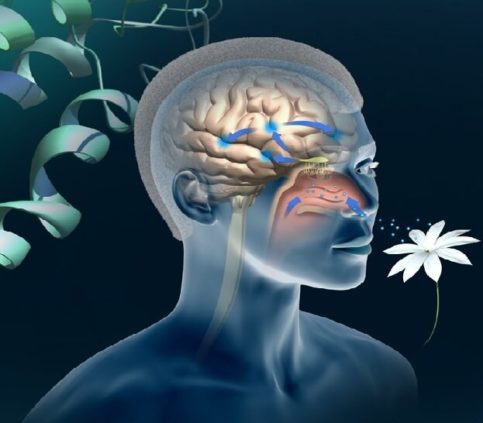
Can you smell that?
While cognitive symptoms are generally the first signs of Alzheimer’s, sense of smell and hearing loss are both connected to brain function and health. When one of these senses goes astray, it can signal some major biological differences occurring in your body.
The Nose Knows
Decreased olfactory function is very common as we age and is linked to a decreased ability to taste and decreased appetite. In fact, odor identification issues are present in over half of those between the ages of 65 and 80, and in over three quarters of those over the age of 80. It’s known that decreased smelling abilities are often an early indicator of neurodegenerative diseases such as Alzheimer’s and sporadic Parkinson’s disease. In turn, olfactory deficits can decrease one’s quality of life and increase the risk for depression. However, there is emerging evidence that “smell training” can improve the ability to smell.
Smell and smell recognition are intricately connected to brain functioning. Hundreds of olfactory receptors in the nose bind the odor molecules and initiate an electrical signal that travels to the olfactory bulb, a structure at the base of the brain. The piriform cortex—located just behind the olfactory bulb— then works to identify the smell. From there, smell information is transmitted to another area of the brain where it is integrated with taste information.
Smell training has been studied in numerous animals of which, when exposed to multiple odors, develop an increased number of connections between brain cells. This process enhances learning and memory of odors. Human smell training involves exposing a person to a variety of odors from major categories such as: flowery, fruity, aromatic, or resinous. The person is asked to perform different tasks such as focus on particular odors, try to detect certain odors, or note the varying intensities.
Neuroplasticity—the generation of new connections and strengthening of existing connections between neurons—is one key element in smell training because it leads to changes in thinking skills or behavior. Generally, smell training is repeated daily for several months. Periods over three months are suggested for older adults, given the reduced plasticity associated with age.
The Ears Have It
In addition to a loss of smell, new studies have linked people with hearing loss to having higher rates of dementia. One particular study found that people with hearing loss were 24% more likely to have Alzheimer’s, and the worse the hearing loss was, the more likely the person was to develop dementia. While hearing loss does not cause dementia, there is certainly an association between the two. The surrounding theories include changes in brain function, a larger cognitive load, and social isolation.
It is important to note that hearing loss does not mean your loved one is guaranteed to develop Alzheimer’s. However, preventative measures can be taken to significantly reduce the likelihood of getting Alzheimer’s, or the severity of it.
One study in Paris provided people with deafness in at least one ear with a cochlear implant and tracked their cognitive performance before and after receiving the implant and auditory rehabilitation. Eighty percent of the people in the study showed cognitive improvement within one year. This is significant, as these are better results than any FDA approved drugs for treating dementia.
Any changes in hearing or smell should be reported to your physician. While hearing loss and sense of smell can indicate many things, it’s important to seek treatment and potentially stave off Alzheimer’s for longer.




